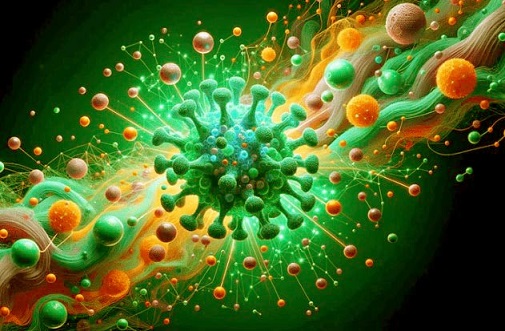SARS-CoV-2 N proteins cause degradation of cellular components involved in RNA interference and RNA splicing
Nikhil Prasad Fact checked by:Thailand Medical News Team Aug 14, 2024 8 months, 1 week, 3 days, 2 hours, 30 minutes ago
Medical News:
The Mysteries of Severe COVID-19 Pneumonia
In a groundbreaking study by researchers from various prestigious institutions in China, the SARS-CoV-2 nucleocapsid (N) protein has been identified as a significant factor in the development of severe pneumonia among COVID-19 patients. This
Medical News report delves into how the N protein triggers this severe respiratory condition and the potential treatments that could alleviate its effects.
 SARS-CoV-2 N proteins cause degradation of cellular components involved in RNA
SARS-CoV-2 N proteins cause degradation of cellular components involved in RNA
interference and RNA splicing
The study, conducted by Chinese researchers from Chongqing Medical University, Peking Union Medical College, Wenzhou Medical University, and Wuhan Institute of Virology in China, among others, sheds light on the mechanisms through which the N protein exacerbates COVID-19 pneumonia.
The N Protein's Role in Pneumonia
COVID-19 has been notorious for its variability, affecting people differently, from mild cases to severe, life-threatening conditions. Among those severely affected, pneumonia has been a common and dangerous outcome. The researchers discovered that the N protein of SARS-CoV-2 plays a pivotal role in this progression.
The study found that the N protein induces the degradation of critical cellular components involved in RNA interference (RNAi) and RNA splicing - Dicer, XPO5, SRSF3, and hnRNPA3. These components are essential for maintaining cellular stability and proper functioning. When degraded by the N protein, the body's ability to manage RNA processing is compromised, leading to significant cellular damage.
Understanding the Cellular Impact
When Dicer, XPO5, SRSF3, and hnRNPA3 are downregulated, several harmful processes are set in motion:
-DNA Damage: The degradation of these components leads to increased DNA damage, a primary factor in the severity of COVID-19. The DNA damage response, usually a defense mechanism, ends up aiding the virus by increasing the expression of the ACE2 receptor, which SARS-CoV-2 uses to enter cells.
-Proteotoxic Stress: This stress occurs when proteins are improperly managed, leading to the accumulation of dysfunctional proteins within cells. The study shows that the downregulation of Dicer and XPO5 results in an increased production of proteins that cannot be properly folded or processed, causing stress and further damage to cells.
-Impaired RNA Splicing: The N protein's interference with SRSF3 and hnRNPA3 disrupts the splicing of RNA, a crucial step in gene expression. This disruption leads to the production of faulty proteins that can exacerbate cellular dysfunction and contribute to severe inflammation and pneumonia.
Age as a Factor in Disease Severity
One of the significant findings of the study is the
correlation between age and the severity of pneumonia induced by the N protein. The researchers observed that older mice had lower levels of Dicer, XPO5, SRSF3, and hnRNPA3 in their lung tissues, which correlated with more severe pneumonia symptoms compared to younger mice.
This age-related decline in these critical components suggests why older individuals are more vulnerable to severe outcomes when infected with SARS-CoV-2. The study provides a clear link between the age-associated decrease in these cellular components and the increased severity of pneumonia in older patients.
Potential Treatments: PJ34 and Anastrozole
The researchers also explored potential treatments that could mitigate the harmful effects of the N protein. Two compounds, PJ34 and Anastrozole, showed promise in alleviating N protein-induced pneumonia.
PJ34, a poly(ADP-ribose) polymerase (PARP) inhibitor, was found to disrupt the interaction between the N protein and the cellular components it degrades. By preventing this interaction, PJ34 helped restore the levels of Dicer, XPO5, SRSF3, and hnRNPA3, thereby reducing DNA damage, proteotoxic stress, and ultimately, the severity of pneumonia.
Anastrozole, commonly used as a breast cancer treatment, was also effective in increasing the expression of Dicer, XPO5, SRSF3, and hnRNPA3. This compound not only mitigated the N protein's effects but also showed potential in treating SARS-CoV-2-induced pneumonia by promoting the expression of these protective cellular components.
Conclusion: A Path Forward in COVID-19 Treatment
This study provides crucial insights into the mechanisms through which SARS-CoV-2 causes severe pneumonia, particularly in older individuals. The findings suggest that targeting the N protein's interaction with RNAi and RNA splicing components could be a viable strategy for treating severe COVID-19 cases.
The discovery of PJ34 and Anastrozole as potential treatments opens new avenues for therapeutic interventions, offering hope for reducing the severity of pneumonia in COVID-19 patients. As the pandemic continues to challenge healthcare systems worldwide, these findings could pave the way for more effective treatments, particularly for the most vulnerable populations.
The study findings were published in the peer-reviewed journal: Nature Communications.
https://www.nature.com/articles/s41467-024-51192-1
For the latest COVID-19 News, keep on logging to Thailand
Medical News.
Read Also:
https://www.thailandmedical.news/news/american-study-discovers-that-malectin-is-a-key-player-in-coronavirus-replication-and-viral-protein-production
https://www.thailandmedical.news/news/japanese-study-finds-that-covid-19-infections-and-vaccines-are-inducing-the-emergence-of-atypical-memory-b-cells
